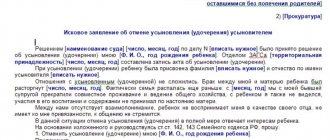Additional expenses for a child are not a simple matter. Both parents are required to participate in additional expenses for children necessary due to illness, injury, or other circumstances.
ATTENTION: our family lawyer participates not only in the procedure for collecting additional expenses for the child, but will also answer your question about how to collect alimony debt at the stage of executing a court decision.
Is it possible to recover money other than alimony?
What expenses are included in child support? The current norms of family law determine the prerequisites aimed at collecting funds related to meeting the needs of children who have not yet reached the age of majority and are not related to alimony obligations. Parents have a number of both responsibilities and rights (enshrined in law), which must be observed without fail. The most significant functions include:
- providing care and attention;
- provision of financial resources aimed at maintaining minors, as well as children who have reached adulthood but are disabled;
- promoting comprehensive development;
- ensuring the right to education.
The implementation of parental responsibilities is equally distributed between both parents, but they cannot always be realized with alimony. The only exceptions are some cases related, for example, to the status of a single mother. Proof of active participation in the process of raising and maintaining a child is the withholding of alimony payments. Their establishment can occur either voluntarily or compulsorily. Of course, you will need to justify the expenses for the child.
If a situation arises, the resolution of which involves additional material costs, the legal representative of the minor has the right to recover funds from the person who regularly pays alimony, subject to a strictly fixed expression.
The corresponding code displays a complete list of circumstances of this type. The main thing is that the claimant provides as much irrefutable evidence as possible to effectively satisfy the claims related to the assignment of additional amounts of expenses established in court.
Methods and form of collection of additional charges. funds
According to the law, additional payments for children are collected in a fixed amount. It is established by the court in the procedure of claim proceedings.
The following circumstances influence the amount of payments:
- Financial situation of father and mother.
- The fact of fulfillment of alimony obligations established voluntarily or compulsorily.
- The amount of monthly maintenance for a minor from the person liable for alimony.
- Children born in the next marriage after divorce.
- Dependents.
- The plaintiff's arguments (on what basis should the money be recovered).
- Other circumstances requiring attention, in the opinion of the parties.
Additional costs are collected in any of two ways:
- Voluntary – drawing up a mutual agreement between the child’s parents, certified by a notary (Article 99 of the RF IC). The structure must correspond to the following points:
- personal data of participants in legal relations;
base;
- calculation of the amount of additional payments;
- rights and obligations of the parties;
- conditions, method and procedure for making payments;
- algorithm for making changes and additions to the text of the contract;
- responsibility;
- reasons for termination of payments;
- details of the recipient and payer;
- date of signing.
Conditions for signing a child support agreement:
- mutual consent of the recipient and the payer;
- joint visit to the notary.
The agreement has the force of an executive document. The parties themselves determine who pays for the notary’s services and in what amount.
- compensation for the funds actually spent by the plaintiff;
current payments or future expenses.
Peculiarities of consideration of the case in court:
- equality of the parties;
- preference for the interests of a minor child;
- assessment of the degree of need;
- proportionality of payments;
- reasonableness;
- determining the regularity of payments - for a certain period or until 18 years of age/removal of the disability group;
- additional form expenses - a fixed amount of money.
Principles for assigning payments in excess of alimony
In order to obtain appropriate resources, it is necessary to have a clear understanding of the existing conditions. Russian family law establishes a number of rules that are taken into account in the collection process:
- Payments are made monthly.
- The transfer process is carried out in a strictly fixed amount.
- The court has established the amount of the mandatory payment.
- In the process of determining the amount to be withheld, both the financial and marital status of each parent are taken into account.
- The recovery can be realized as future expenses or in the form of compensation for expenses for the baby that have already been incurred.
This is also important to know:
Alimony for a second child in a second marriage
All of the above aspects must be taken into account in the process of drawing up a statement of claim; a sample is presented below.
Who can receive additional funds?
The right to receive additional money from the father or mother in addition to alimony can be used by:
- Children who have not yet reached adulthood.
- Sons and daughters who are already 18 years old, but at the same time they are disabled and are not able to independently ensure the process of their own life activities.
The fact of a minor's incapacity for work must have official confirmation, presented in the form of a medical report, issued by a special commission. In the process of determining that a citizen is disabled, the process of assigning disability group I or II occurs.
In certain situations, if there is a disability of group III, a person may be considered disabled, subject to a real lack of opportunities for subsequent employment. But, this circumstance must be prescribed by representatives of the medical commission at the place of residence.
It is important to take into account the fact that if an adult child who is disabled starts a family and has children, then all responsibilities associated with subsequent maintenance pass to the spouse, as well as to adult children.
How to recover additional expenses through court
The best way to resolve financial issues regarding a child is to draw up an agreement between the mother and father on making monthly payments. The document specifies additional costs and features of the transfer of money, which eliminates further disputes and obliges the person to fulfill financial obligations. The situation is more complicated when there is no agreement, and the mother or father refuses to bear additional expenses.
In this case, the only solution is to go to court. Here it is important to adhere to the following algorithm of actions.
Filing a claim
The first step is filling out a claim application. When performing this step, it is advisable to have a sample in front of your eyes and follow the rules for its design.
The document must contain the following information:
- Name of the court and its address.
- Plaintiff's details - full name, address and telephone number.
- Information about the defendant - full name, address and telephone number.
- Document's name.
- A detailed statement of the situation indicating the reason why the parent is forced to turn to the judicial authority for help. This may be the need to care for a disabled person, treatment, lack of funds for housing, etc. The “body” of the document must indicate that attempts at a peaceful solution have led to nothing.
- Request to the court. This part of the claim indicates the parent’s demand indicating a specific amount, as well as a request to be exempt from paying state fees.
- List of attachments to the claim (required documents are discussed below).
- The day the application was submitted, the plaintiff’s full name and signature.
When specifying the amount of the penalty, a specific figure is indicated, and not a percentage of the defendant’s wages or income.
| Statement of claim for recovery of additional expenses for the child |
Required documents
Before filing a claim, it is important to take care of collecting the necessary documents attached to the application. This package includes:
- child's certificate (birth certificate);
- documents confirming the fact of marriage or divorce (if such circumstances exist);
- justification for the urgent need for additional funds (agreement with the hospital, checks, etc.);
- papers confirming the parent’s expenses for the child for future months or years;
- passport of the person representing interests in court, if the parent cannot do this in person;
- a copy of the claim for transmission to the defendant party.
The above list is indicative and may change depending on the current situation. Sometimes the court will require additional paperwork. According to the Tax Code of the Russian Federation (Article 336.36, paragraph 1, paragraphs 2 and 5), there is no need to pay state duty.
Transfer of papers to the judicial authority
The collected documents are transferred to the court office in relation to the place of residence of the plaintiff or defendant. This rule is stipulated by the Code of Civil Procedure of the Russian Federation (Articles 28 and 29).
Visiting the process
You must participate in the court hearing in person or involve a representative. According to the law, the court accepts evidence and justifications not attached to the claim. This right is specified in the Civil Code of the Russian Federation (Article 35). The judge examines the financial situation of the parties and decides whether there is a need for payments and what the amount of additional costs should be. Sometimes jurisdiction is not proven, and the plaintiff is denied payment of the requested amount. This happens when a father or mother has a new family and dependents who need money after a divorce.
Waiting for a decision
After considering the circumstances of the case, the judge issues a decision. The resolution comes into force after 30 days, if during this period the validity has not been appealed to the district judicial authority. A month later, the plaintiff is given a writ of execution.
What types of income are they paid from?
Resolution of the Government of the Russian Federation No. 841 (last changes were made in 2015) establishes the categories of income from which alimony is withdrawn. These include:
- official salary;
- salary received by military state and municipal employees;
- various types of fees;
- income received in the process of engaging in entrepreneurial activity;
- pensions and scholarships.
What kind of housing is considered uninhabitable?
According to paragraph 47 of the Decree of the Government of the Russian Federation of January 28, 2006 “On approval of the Regulations on recognizing premises as residential premises, residential premises unsuitable for habitation and an apartment building as unsafe and subject to demolition”, residential premises are considered unsuitable for living in the following cases:
- housing has damage and deformations on load-bearing and enclosing structures; — there are no separate elements of engineering communications (water supply is not functioning, there is no centralized electricity, etc.); — ventilation integrates the air flows of the kitchen and sanitary premises with the rooms; — the air temperature in the premises is below 18 degrees for an extended period of time; — air humidity constantly exceeds the minimum threshold of 60%; - there is no insolation in the number of rooms established by the standards (for one to three-room apartments - at least one room, for apartments of a larger area - at least two rooms); - the room is located in the basement or on the ground floor; — high concentration of chemical, biological and toxic substances potentially dangerous to humans. — excess levels of background radiation, sources of noise, vibration, electromagnetic fields.
Article on the topic
Filial duty.
Who will be forced to pay child support to parents? Signs of unsuitable housing are also :
- exceeding sanitary and epidemiological safety indicators in the atmospheric air and soil, as well as in residential buildings located in industrial zones, areas of engineering and transport infrastructure, provided that it is impossible to minimize risk criteria to an acceptable level by engineering and design solutions level;
— the presence of dangerous zones of landslides, mudflows, snow avalanches, zones of probable destruction during man-made accidents;
— adjoining an overhead AC power line and other objects that create, at a height of 1.8 m from the earth’s surface, an electric field strength of an industrial frequency of 50 Hz of more than 1 kV/m and a magnetic field induction of an industrial frequency of 50 Hz of more than 50 μT;
— damage as a result of explosions, accidents, fires, earthquakes, uneven subsidence of soil;
The decision to declare housing unsuitable is made by a special interdepartmental commission. The owner needs to submit an application to the interdepartmental commission responsible for assessing the quality of housing. The application should be accompanied by floor plans, a technical passport, and complaints about unsuitable living conditions. Based on the results of the examination, the commission can recognize the house as unsafe or suitable for further use.
Can I receive it before the baby is born? 12 questions about child support Read more
Collection procedure
Additional child support cannot be considered as a component of alimony. In this case, there is a possibility associated with the simultaneous start of deduction of both payments from income. If the person obligated to make child support payments evades appropriate financial support, the parent or other legal representative can recover all the necessary resources by judicially proceeding according to the following scheme:
- Filing a claim involves drawing up an application in the form and attaching a package of necessary documents.
- The opening of proceedings is aimed at initiating a case, preparing the proceedings, as well as studying the reasons for the pores
- The preliminary hearing concerns the identification of a number of the most problematic issues, the filing, if necessary, of the main motions.
- Judicial review requires the presence of the parties, examination and evaluation of evidence, as well as consideration of oral evidence.
- It is necessary to take into account that alimony is a mandatory payment, and additional material payments do not belong to this category.
- Making the final decision.
- Purpose of recovery.
This is also important to know:
State duty on alimony
The writ of execution must be considered as the final document. If the other party refuses to comply with the court decision, the following measures can be used:
- limit travel beyond the Russian border;
- seize property;
- ensure that the amount is withheld by the employer.
If the specified funds are not paid, the accrual of penalties, as well as criminal prosecution, cannot be used.
How to make an application
The statement of claim, prepared in strict accordance with all standards, is submitted to the office of the judicial authority. If there are errors or corrections in the document, which contradict procedural norms, it is returned. For the objective consideration of the application, it is necessary to draw it up in accordance with all standards.
- The following details are indicated in the upper right corner of the page: the name of the body to which the documents are submitted, personal information about the parties participating in the process, actual place of residence, contact phone number, information about the children in respect of whom the proceedings will take place.
- The descriptive part provides information about marital status, children together (indicates who they live with), describes the subject of the dispute, provides the evidence base, and, if necessary, attaches additional documents.
- The operative part contains requirements regarding the need to incur large expenses that require additional payments for the child.
In the process of drawing up the document, you must adhere to the following rules:
- presentation of information using an official business style;
- the use of obscene words and phrases is prohibited;
- objectivity, brevity and meaningful presentation of all necessary information;
- restraint - the absence of specifically taken judgments in relation to, for example, the defendant, which is completely useless and is not documented;
- all events must be presented in chronological order.
Deadlines for collecting additional payments
The establishment of the period necessary to collect additional financial resources aimed at retaining the child is established in accordance with the characteristics of the life circumstances in which the child now finds himself and, accordingly, how urgent the need for their involvement is at a particular stage. If we are talking about an ordinary child, this process can be implemented at any time, subject to the occurrence of certain events of an extraordinary nature and before he turns 18 years old. As for a son or daughter with a complex illness, in this case it is permissible to establish all relevant payments for life.
This is also important to know:
Search for alimony debtor: grounds for the procedure and legal search methods
If there is a court order indicating the need to collect additional resources from one of the parents, the necessary actions can be carried out either monthly (in parallel with the payment of child support) or one-time. A valid and documented court decision is key.
What else should a father or mother pay besides alimony?
If there is no voluntary agreement between the parents, then, in accordance with Part 1 of Art. 86 of the Family Code (FC) of the Russian Federation, the alimony payer can be forced to bear additional expenses for children if the following circumstances exist:
- serious illness of the child;
- serious injury to children;
- the need to pay for outside care;
- lack of residential premises suitable for permanent residence;
- other circumstances.
Additional alimony can be recovered for both minors and adult disabled children.
It was the phrase “other circumstances” that gave rise to many disputes between recipients and payers of funds for children: what exactly is considered other circumstances, and in what cases is the collection of additional alimony an abuse?
Many recipients of alimony believe that additional alimony can be collected for various large periodic or one-time expenses, including those related to meeting the household needs of the child - expenses for repairs in an apartment, payment for sections, clubs, educational courses, trips to a camp or sanatorium, etc. Further.
It is worth noting that such attempts are not always unsuccessful - if you correctly draft a claim and prove the existence of an exceptional situation, the court may decide in favor of the plaintiff and recover additional expenses for the children from the defendant.
Required documents
Each copy of the statement of claim must be supplemented with documentation, the use of which helps confirm the occurrence of a particular case. The most significant documents include:
- passport details of each of the parties participating in the process;
- legal determination of marital status (marriage or divorce, birth of children);
- a certificate of composition of children, on the basis of which the fact of residence of the offspring with one of the parents is confirmed;
- information about the income received by each party;
- medical documents confirming the need for treatment or the provision of a disability group (an alternative may be a recommendation for registration of a particular group);
- receipts confirming the costs of purchasing medications, as well as lists containing information about the need to purchase a whole range of medications to ensure an effective treatment process in the future.
Attached copies must be certified in accordance with the procedure established by law. If a third party takes part in the trial, an additional package of all necessary documents must be prepared for him. Providing additional materials is not prohibited. If during the trial there is a need to provide additional documents to help understand what is happening, they will be requested in accordance with the established procedure.
As for attaching a check for payment of the mandatory court fee, in this case there is no such need. All costs are passed on to the defendant.
Calculation of the payment amount
In accordance with the norms of the law, both the father and mother of the child have completely identical responsibilities for financial support of the child. Based on this, a rule is formed according to which the amount of necessary material costs for the baby is evenly divided between each of the parents. For example, if the cost of surgery is 70,000 rubles, then both parents are required to pay a multiple of 35,000 rubles.
At the same time, there is also a principle according to which the current situation of both the father and mother must be taken into account. To ensure a balance of interests of each party, the court must take into account the following aspects:
- features of the financial situation of the defendant, as well as the plaintiff;
- the specifics of their marital status;
- the existence of a permanent place of work that generates income.
Thus, if we consider the previously given example taking into account qualitatively new circumstances, it is worth taking into account the need to carry out calculations differently. Previously, it was established that due to the child’s illness, each of them is obliged to pay 35,000 rubles. But, during the court hearing, it was found out that the child’s father now has income related only to receiving a disability pension. This means that when making the required payment, he will simply be deprived of his means of subsistence (even the purchase of a basic set of food products). As for the mother of a sick child, she has a medium-sized business that brings in a fairly good and, most importantly, stable income.
Based on taking into account all of the above factors, during the judicial process, a decision was made not only to reduce the amount of money that a father with a disability group had to pay for the treatment of the child, but also to completely release him from such an obligation.
Additional alimony and expenses for a disabled child (or in case of serious illness or injury)
This option is acceptable, only the judicial authorities take into account the following criteria:
- the presence of a pension or certain social benefits received for the child;
- implementation of a set of care measures by parents or persons hired on a paid basis;
- the existence of child support payments made by the second parent;
- presence of other life circumstances.
This is also important to know:
Child support in a fixed amount of money at the subsistence level: filing an application and the legislative framework
In addition to basic expenses, such a child requires constant medical care and treatment, so additional alimony is often collected.
For this reason, the plaintiff needs to take a balanced approach to taking into account all the necessary criteria, and also evaluate the degree of his own prudence when setting requirements for the size of the desired amount. If the court decides that the funds received as alimony, as well as a pension or benefit, will be sufficient, it is decided that it is necessary to refuse the relevant application.
If there is no disability, then alimony for the treatment of the child is not paid separately, but the court takes into account the following criteria:
- need for surgery;
- undergoing rehabilitation;
- expensive drug treatment;
- carrying out prosthetics or expensive examinations (both in Russia and in foreign countries).
Free legal consultation We will answer your question in 5 minutes!
Call: 8 800 511-39-66
In this case, the size of the amount that is already paid as alimony, and the current financial and marital status of each of the parents, the availability of subsidies, as well as additional social benefits, and the amount of expenses for the child for various needs that have already been incurred are taken into account.
Free legal consultation
We will answer your question in 5 minutes!
Ask a Question
An example from judicial practice
In judicial practice, additional expenses for a child other than alimony are periodically encountered.
Many parents tend to be of the opinion that ensuring an effective collection process is only permissible if the child is diagnosed with a disability. If you carefully analyze and take into account numerous examples from domestic judicial practice, you can come to the conclusion that in reality the situation is completely different.
One example could be the decision made by the Oktyabrsky District Court of Penza. The defendant filed a request to cancel the decision of the court of first instance regarding the allocation of additional monetary payments, since after undergoing the treatment process, the child lost his disabled status. The judge rejected the child's father (who acted as a defendant), focusing on the fact that the minor child really needs further operations, as well as expensive drug treatment. At the same time, the data from medical institutions that led to the removal of the disability group were not taken into account as those that have significant power and can affect the final outcome.
Thus, special attention must be paid to collecting as complete an evidence base as possible.
What to do next
As soon as court documents are received, they must be transferred to the authorized body. There are two ways here:
- Personally give them to the employer to withdraw the established amount from the defendant’s salary (IC RF, Art. 109).
- Submit the writ of execution to the FSSP at the place of registration of the losing party. Along with it, a statement is submitted demanding the recovery of funds. In the future, the bailiffs themselves hand over the papers to the place of employment of the losing party.
Lawyers note that it is better to give preference to the second option, because FSSP employees have the rights to contact the enterprise and demand payments from the employer. In addition, they can monitor the payer for the fact of transferring the amount established by the court. In case of evasion of obligations, various sanctions are applied to violators, including forced collection and fines.
Additional questions
Is it possible to recover additional funds? child education
Despite the fact that specific legislative acts do not directly prohibit the submission of all necessary documents upon the occurrence of this obligation, actual judicial practice does not recognize such additional expenses for the child. There is not a single positive solution on this issue. This is explained by the absence of a threat to life and health, as well as the optional nature of the need to receive education on a paid basis.
If your child is often sick
In this case, even in the absence of disability, it is quite acceptable to receive additional financial resources, but only based on taking into account a number of factors:
- need for surgical treatment;
- availability of medical confirmation of a serious diagnosis;
- purchase of a significant amount of expensive medicines;
- the need for research.
This is also important to know:
State duty on alimony
In this case, the court will also take into account:
- the amount of money spent for treatment;
- features of the material well-being of each parent;
- the existence of additional material obligations;
- the presence of privileges and benefits provided by both state and municipal authorities.
Payment for a sea holiday
In the event that there is a professional recommendation provided by a medical professional in a strictly established manner, the court may consider and satisfy the corresponding request for additional funds.
At the same time, attention is focused on the cost of the voucher, the existence of certain benefits associated with its purchase, as well as the participation of other relatives in the purchase process. Only after a thorough analysis of all the necessary criteria is it decided to help the child or not.
Are additional options possible? collections after 18 years
The implementation of this option is permissible only in exceptional cases provided for at the legislative level. In the process of making a certain decision by the court, the balance of rights and obligations characteristic of each of the parties is taken into account.
Is it possible to refuse a claim for additional funds?
Should a person pay anything else in addition to the collected alimony? Both parents bear responsibilities related to adequate financial support for the child. It is not possible to evade payment of elements even if the official level of wages is quite low or the defendant has dependents in his care.
If the obligation assigned at the legislative level is not fulfilled, a category such as jurisdiction is used. The only right that the defendant has in this case is aimed at the possibility of appealing to the court with a demand to reduce the initially established amount of alimony payments.
Court representatives also pay attention to the marital status of each parent. For example, if the child's mother remarried and her new husband is able to provide financially for both her and her stepson, the amount originally claimed may change significantly. In a situation where it turns out that the child’s father has remarried and, alternatively, has two dependent children, the amount of payment may generally be reduced to the minimum acceptable level.
Payment of utility costs, rent, mortgage
Long-term judicial practice shows that the collection of additional expenses for a child mainly occurs due to additional waste caused by the high cost of housing.
If we are talking about the need to make utility payments for real estate owned (in full or in part) by a child, then there is an effective basis for collecting the appropriate amount of resources. The most important thing is to submit to the court the most competently completed calculation, which will display and confirm the need to attract additional resources.
Taking into account the statement of claim for an additional amount of money, indicating as the main reason the need to pay for rented housing or making a mortgage payment, the likelihood of its consideration, and even more so, satisfaction, will be minimal. This is explained by the fact that the child is not the owner of such an object. This means that there are no prerequisites for storing it for subsequent use.
Lawyer's answers to private questions
Does a mortgage affect the collection of additional child support costs if it is paid by his mother?
No. It is believed that when taking out a mortgage, even with the allocation of a share to a son or daughter, she had to weigh the pros and cons. It is impossible to collect additional expenses only on the grounds that the mother pays the mortgage loan and cannot cope with the maintenance of the children.
Is it possible to recover additional expenses without getting a divorce?
Yes, you don't have to get divorced for this. In court, the only important thing is that the second parent does not participate in them voluntarily, and the very grounds for recovery.
Who bears the additional costs of raising a child and how much?
Usually all costs are divided in half between the parents. But the court may deviate from this principle, acting in the interests of the minor, if the financial situation of each party allows it.
Is it possible to recover additional expenses for a daughter if her ex-husband (her father) does not work?
Yes. Lack of work does not relieve one from the obligation to support a child.
Will it be possible to recover alimony and additional expenses for my son through the court if the father is not identified?
No. First you need to establish paternity. This is done through the registry office on a joint application (Article 51 of the RF IC) or through the court (Art. 49 of the RF IC), if the man does not recognize himself as the father and does not want to apply to the registry office. But the statement of claim can reflect several demands at once: to establish paternity, to collect alimony and additional expenses.






